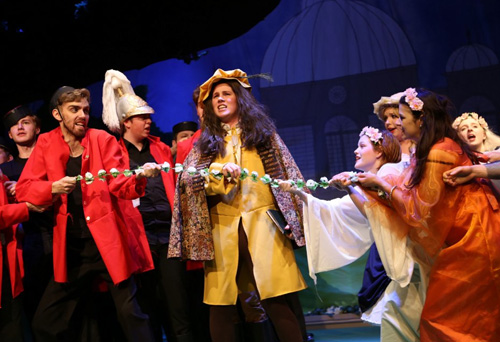 United Kingdom Gilbert & Sullivan, Patience: Manchester Universities & RNCM Gilbert & Sullivan Society, / Lucy Armstrong (conductor), Manchester Grammar School, Manchester, 18.2.2015 (RJW)
United Kingdom Gilbert & Sullivan, Patience: Manchester Universities & RNCM Gilbert & Sullivan Society, / Lucy Armstrong (conductor), Manchester Grammar School, Manchester, 18.2.2015 (RJW)
Cast:
Colonel Calverley — Henry Page
Major Murgatroyd— Liam McNally
Duke of Dunstable — Dean Parker
Reginald Bunthorne — Jono Miles
Archibald Grosvenor — Edward Robinson
Lady Jane — Lucy Vallis
Lady Angela — Mathilda du Tillieul McNichol
Lady Saphir — Ingvild Schultze-Florey
Patience — Elizabeth Barry
Solicitor — Jonathan Hunter/Tom Guyer
Production:
Director – Olivia O’Connell
Set – Lucie Greenwood/Duncan Wenham
Costumes – Lisa Kinch/Ruth Steele
Patience was the sixth comic opera written by WS Gilbert and composed by Arthur Sullivan in 1881. It followed The Pirates of Penzance and embraced a wave of Victorian fashion to caricature the Pre-Raphaelite movement of artists, poets and writers, with Oscar Wilde as their progenitor. Such was Wilde’s fame at the time that Richard D’Oyly Carte encouraged him to tour America with lectures in advance of playing Patience there. The plan worked and brought good attendances.
This production of Patience is played mainly traditionally (unusual for productions from this group). The Society has achieved a good result which reflects the enormous amount of work put into this presentation. Because of the unacceptably high cost of hiring the RNCM theatre last year, the committee made the decision to take their production out of the city centre and use the excellent, yet compromised, facilities of Manchester Grammar School instead. The comfortable auditorium, apron stage, excellent acoustics and good lighting rig added to one’s enjoyment – including the ease of parking. However, the poor placement of the orchestra and lack of upstage area with tight wing space must have hampered a choreographer’s dream. Nevertheless the results were remarkable and the stage floor well used.
A strong cast made up of mainly professional singers in training enhanced the quality of performance. Outstanding was Elizabeth Barry in the central role of Patience. Her portrayal as the simple-minded North Manchester milkmaid found the right reactions to cut through the sophisticated world of aestheticism with her innocent empty-headed logic that nicely amplified Gilbert’s humour. Her pretty petite form and Sheringhamesque costume (with rustic milk pail) brought the right ambience to the part: her light lyrical soprano voice was just right and delightful in the lovely “For I am blithe” and contrasting “Love is a plaintive song”. The wearing of modern high heels instead of flats was incongruous, though.
An aesthetic transformation by the military men in “It’s clear that medieval art” was amusing and brought well-timed retorts from members of the audience. The ensemble was magnificent, as was Grosvenor’s rendition of “A magnet hung in a hardware shop” where all words were clearly heard. In fact, the diction was outstanding throughout, and nearly all characters projected their voices exceptionally well. Bunthorne and Grosvenor with well-timed lines were appropriately dressed and amusing in their long-haired wigs with flamboyant pink bow and mustard artist’s hat respectively. Their interaction was beautifully played throughout and Lady Jane’s looming presence, with asides to the audience, was strong. Her opening mime to Act II on a real ‘cello was hilarious and warm toned in her “Silver’d is the raven hair”.
The soloists have taken effort to understand their characters as well as give polished singing performances. The quality of singing was exceptionally good and only occasionally did two characters not have enough volume to fully exert themselves. The Act I finale sestet “I hear the soft note”” was superb with its fine
tonality and balance, and a highlight of the evening. There is often a tendency in amateur choruses to spot individual faces but this was averted with true professionalism last night. A large well-rehearsed chorus of 38 provided some excellent singing in the double choruses and provided good stage effects. The traditional ‘cobwebby gravy’ colours of the maidens’ costumes had given way to a harmonious brighter look that blends well. Their white dresses with their contrasting broad sashes for the Act II finale looked charming. Most memorable was the maidens’ entrance, “Let the merry cymbal sound” with air patterns made by moving ribbons on sticks and billowing lengths of blue chiffon blending to form broader patterns of movement. Good choreography was shown in the Dragoons’ opening chorus and the raffle scene provided a good stage picture.
Lighting cues can sometimes become a distraction when not complementing a mood change with subtlety. However, the quick changes used for Bunthorne’s asides from the static dragoons looked well. The 26 strong orchestra gave a brilliant and sensitive reading of Sullivan’s score throughout, with good tempi set by conductor, Lucy Armstrong. Their position under the apron stage was unfortunate as the cut-away front was small and only allowed a whisper to be heard from the generously-sized hard-working string section. An extra 2 metres’ width to the aperture next year would be advantageous and still allow side flanks to the stage floor for movement.
This was a memorable production and thanks the untiring committee, director, stage staff and performers has become another feather in Grosvenor’s hat to stand high alongside the decades of previous productions. The group will be taking this production to the International Gilbert & Sullivan Festival at Harrogate on 12th August 2015 where we wish them well.
Raymond J Walker